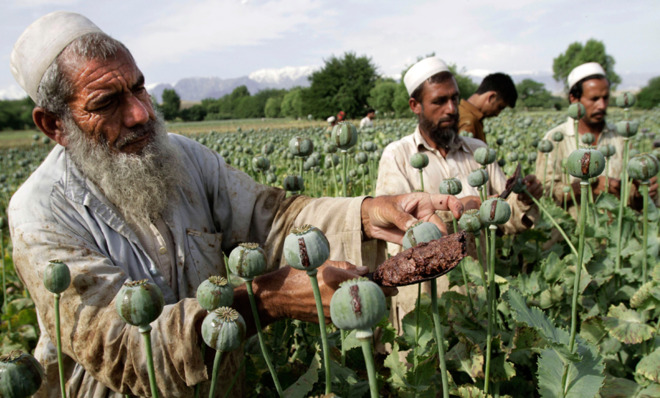How NATO spent $200 million teaching Afghan cops to read — and failed
Well, Afghanistan is a burgeoning narco-criminal state that is being fueled by American blood and tax dollars, so...


A free daily email with the biggest news stories of the day – and the best features from TheWeek.com
You are now subscribed
Your newsletter sign-up was successful
The last time The Week examined the findings of John Sopko, the Special Inspector General for Reconstruction in Afghanistan (SIGAR), we learned that American taxpayers were footing the bill for $500-per-gallon diesel (market price: $5) and paying $200,000 per thermostat for a small medical clinic that was never completed. Soon after, it came to light that such waste and corruption isn't limited to phantom construction projects. It is also endemic in our counternarcotics activities.
Despite a $10 billion investment by U.S. taxpayers, there are more opium poppies under cultivation in Afghanistan today than on September 10, 2001, according to congressional testimony by Sopko. "In the opinion of almost everyone I spoke with, the situation in Afghanistan is dire with little prospect for improvement in 2014 or beyond," he said. "All of the fragile gains we have made over the last 12 years on women's issues, health, education, rule of law, and governance are now, more than ever, in jeopardy of being wiped out by the narcotics trade, which not only supports the insurgency but also feeds organized crime and corruption."
If there is a recurring theme in the SIGAR office's findings, it's the grotesque mismanagement of American dollars by Afghan bureaucrats, government contractors, and hapless U.S. officials. And it's not limited to the drug war and infrastructure projects.
The Week
Escape your echo chamber. Get the facts behind the news, plus analysis from multiple perspectives.

Sign up for The Week's Free Newsletters
From our morning news briefing to a weekly Good News Newsletter, get the best of The Week delivered directly to your inbox.
From our morning news briefing to a weekly Good News Newsletter, get the best of The Week delivered directly to your inbox.
NATO's Combined Security Transition Command–Afghanistan (CSTC-A) rightfully believes that basic reading skills are required for the Afghan National Security Forces to be effective. In 2009, they instituted a $200 million, five-year-plan with a goal of 100 percent literacy in that sector. This is year five, and the command would have you believe that the results are going swimmingly. By December, they expect that 100 percent of personnel will be able to read.
SIGAR took a look at the books and found that, yes, 100 percent literacy will be achieved — if you use the personnel figures from 2009. The problem is that the authorized end strength of Afghanistan's security forces has grown to 352,000, and "100 percent literacy" is more like 64 percent at best.
According to a SIGAR report that was issued Tuesday, "Several [NATO Training Mission–Afghanistan/CSTC-A] officials told us they do not know how the goal for the literacy program was developed, but that attaining it based on the current authorized ANSF end strength may be 'unrealistic' and 'unattainable.'" [Full report: PDF]
Few would be shocked to learn that the goals of a government five-year plan were pulled out of thin air and later found to be ridiculous. But this being Afghanistan, it gets so much worse. Here are the problems that Sopko's office found with the literacy program. Three government contractors are responsible for the plan's implementation, and there is no independent verification of the results of their literacy testing. None of the contractors running the training programs have a way to meaningfully track the security force recruits. There is no definition of what a "literacy class" means, exactly. According to the report, "The lack of defined requirements for classes and length of instruction resulted in one contractor billing for classes held for as little as two hours a month and for multiple classes at one site that could have been combined into one class."
A free daily email with the biggest news stories of the day – and the best features from TheWeek.com
There isn't even a defined standard for reading proficiency.
The absence of metrics is business as usual for the war in Afghanistan. Last year, SIGAR released a report on U.S. anti-corruption activities in Afghanistan. I hate to spoil the ending, but as it turns out, Afghanistan is still corrupt. The more interesting part of the report, however, notes the lack of a "comprehensive U.S. strategy or related guidance that defines clear goals and objectives for U.S efforts" to fight corruption. Whether it's pro-literacy programs or anti-corruption activities, it's a hell of a lot easier for the U.S. to declare victory when nobody actually defines victory. [Full report: PDF]
It's not just a standard for "success" that's undefined; in Afghanistan, they're not even sure of the definition of "standard." Here is how government contractors successfully deployed a nationwide system to track criminal cases for the Afghan justice department. They installed the system in seven of Afghanistan's 34 provinces, and then retroactively defined "success" as seven provinces. (You have to wonder why they didn't just define success as a single province, and then claim to have exceeded its goals by 700 percent.) [Full report: PDF]
None of this has escaped the attention of Congress. "When you have contractors utterly failing to meet goals, and then going back retroactively and changing those goals to make it seem like they succeeded, you've got a major problem," said Sen. Claire McCaskill (D-Mo.) in a press release. She serves as the chairwoman of the Subcommittee on Financial & Contracting Oversight and requested the investigation. "Unfortunately, waste, fraud, and abuse has too often been the result when it comes to the billions we've spent in Afghanistan, and the State Department needs to take action immediately to implement safeguards over these contracts."
"Afghanistan," according to Sopko, "is universally recognized as one of the most corrupt countries in the world." Since 2002, the U.S. has appropriated nearly $100 billion to rebuild Afghanistan. Nobody expected the place to look like Switzerland by the time we left, but we could have at least aimed for something loftier than Chechnya circa 1998. The Afghan government is rife with corruption; drug cartels have more influence than the U.S. State Department; and the Taliban is poised to step in the moment we withdraw. Afghanistan is a burgeoning narco-criminal state that is being fueled by American blood and tax dollars. Its courts don't work, and its cops can't read.
If the U.S. government is that determined to burn mountains of money we don't actually have, couldn't we at least burn the dollars in the United States? At least then our matchstick makers could turn a profit, and somebody in the U.S. would benefit from it all.
David W. Brown is coauthor of Deep State (John Wiley & Sons, 2013) and The Command (Wiley, 2012). He is a regular contributor to TheWeek.com, Vox, The Atlantic, and mental_floss. He can be found online here.
-
 How the FCC’s ‘equal time’ rule works
How the FCC’s ‘equal time’ rule worksIn the Spotlight The law is at the heart of the Colbert-CBS conflict
-
 What is the endgame in the DHS shutdown?
What is the endgame in the DHS shutdown?Today’s Big Question Democrats want to rein in ICE’s immigration crackdown
-
 ‘Poor time management isn’t just an inconvenience’
‘Poor time management isn’t just an inconvenience’Instant Opinion Opinion, comment and editorials of the day
